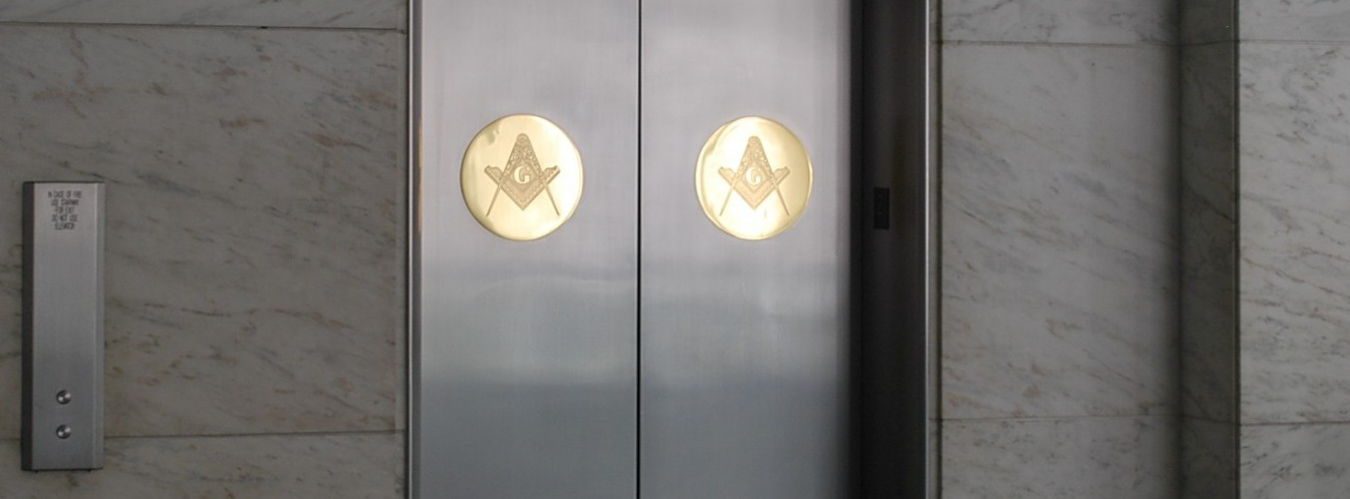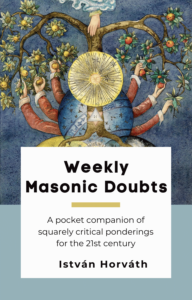Almost twenty years ago I arrived in Canada already with a Masonic past behind me: I was a Master Mason and Past Grand Librarian at home. Luckily, I have met earlier a visiting brother in my mother lodge, who happened to hail from Hamilton, Ontario. Soon after my arrival, he introduced me to his lodge and I visited them several times.
When I moved away to a suburb of Toronto, I contacted a few lodges in the area and began to visit them – hoping to find one day a new home for my Masonic endeavours. One evening I ended up in a lodge, where nobody could vouch for me because nobody knew me from a lodge. And they proceeded as the rules dictate: took me in a side room and a board of trial was hastily called to examine my credentials and my Masonic knowledge.
I had a letter from my mother lodge but when nobody knows you – it is not enough. I knew that, so I wasn’t worried about the fact itself, I was more worried about my less than stellar (English) language skills, especially when it comes to the Craft terminology. Thanks the GAOTU during my visits in the Hamilton lodge I figured out a few basic differences in our rituals, for example.

Considering that he was also an actor and playwright, the ritual is not very theatrical although it is very impressive. We will talk in more details about certain aspects of this beautiful work, now I will just mention a small detail, which turned out to be of vital importance during my trial by that board, North of Toronto. In the Schroeder ritual the well-known knocks from the Emulation ritual are exactly in opposite order: what is first in Canada, is the third in Schroeder, and vice-versa, while the second is identical.
I can’t really recall the other questions, but I clearly remember one of the board members asking me if I knew the knocks on the door in first degree. I do, I replied, only tell me, do you want to hear the knocks from my mother lodge or those from the Canadian/Ontario lodges? Because they are not the same… You see, when Schroeder decided to go back to the ancient English rituals, he reached back to the variants from before the well-known “exposures” in the 1700s. Those exposures resulted in some changes in the original… –
“OK, guys, let him in, he knows more than we do”, said one board member jokingly, and they welcomed me on the board. I am sure, they knew way more about the Canadian way of doing everything correctly than I did. However, this small anecdotal event stayed with me for many many years in my Masonic journey in the Great White North.
Even if I didn’t realize at that time it became almost symbolic for the years spent since in Canadian lodges.
- F.L. Schröder – his biography from Mackey’s Masonic Encyclopedia:
An actor and a dramatic and Masonic writer, born at Schwerin, November 3, 1744, and died near Hamburg, September 3, 1816. He commenced life as an actor at Vienna, and was so distinguished in his profession that Hoffmann says “he was incontestably the greatest actor that Germany ever had, and equally eminent in tragedy and comedy.” As an active, zealous Freemason, he acquired a high character. Bode himself, a well-known Freemason, was his intimate friend.
Through his influence, he was initiated into Freemasonry, in 1774, in the Lodge Emanuel zur Maienblume. He soon after, himself, established a new Lodge working in the system of Zinnendorf, but which did not long remain in existence. Schroeder then went to Vienna, where he remained until 1785, when he returned to Hamburg. On his return, he was elected by his old friends the Master of the Lodge Emanuel, which office he retained until 1799.
In 1794 he was elected Deputy Grand Master of the English Provincial Grand Lodge of Lower Saxony, and in 1814, in the seventieth year of his life, he was induced to accept the Grand Mastership.
It was after his election, in 1787, as Master of the Lodge Emanuel at Hamburg, that he first resolved to devote himself to a thorough reformation of the Masonic system, which had been much corrupted on the continent by the invention of almost innumerable advanced Degrees, many of which found their origin in the fantasies often credited to Alchemy, Rosierucianism, and Hermetic Philosophy. It is to this resolution, thoroughly executed, that we owe the Masonic scheme known as Schroeder’s Rite, which, whatever may be its defects in the estimation of others, has become very popular among many German Freemasons. He started out with the theory that, as Freemasonry had proceeded from England to the Continent, in the English Book of Constitutions and the Primitive English Ritual we must look for the pure unadulterated fountain of Freemasonry.
He accordingly selected the well-known English Exposition entitled Jachim and Boaz as presenting, in his opinion, the best formula of the old initiation. He therefore translated it into the German language, and, remodeling it, presented it to the Provincial Grand Lodge in 1801, by whom it was accepted and established. It was soon after accepted by many other German Lodges on account of its simplicity. The system of Schroeder thus adopted consisted of the three Degrees of Ancient Craft Masonry, all the higher Degrees being rejected.
But Schroeder found it necessary to enlarge his system, so as to give to Brethren who desired it an opportunity of further investigation into the philosophy of Masonry. He, therefore, established an England, or Select Historical Union, which should be composed entirely of Master Masons, who were to be engaged in the study of the different systems and Degrees of Freemasonry. The Hamburg Lodges constituted the Mutterbund, or Central Body, to which all the other Lodges were to be united by correspondence.
Of this system, the error seems to be that, by going back to a primitive ritual, which recognizes nothing higher than the Master’s Degree, it rejects all the developments that have resulted from the labors of the philosophic minds of a century. Doubtless in the sol advanced degrees of the eighteenth century there was an abundance of chaff, but there was also much nourishing wheat. Schroeder, with the former, has thrown away the latter. He has committed the logical blunder of arguing from the abuse against the use. His system, however, has some merit, and is still practiced by the Grand Lodge of Hamburg. ↩


